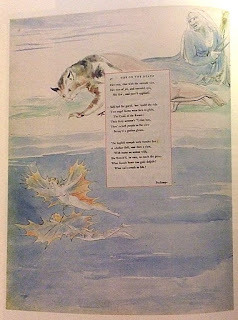Can touch immortals, 'tis a soul like thine:
A soul supreme, in each hard instance tried,
Above all pain, all passion, and all pride,
The rage of power, the blast of public breath,
The lust of lucre, and the dread of death.'
Epistle to Robert, Earl of Oxford, and Earl Mortimer
Alexander Pope
(1721)
Today’s poem owes much to the friendship that
existed between the Scriblerians (as they are now referred to). After Parnell’s death in 1718, Alexander Pope
prepared an anthology of the late writer’s poems, composing this dedicatory
verse to preface the collection and delivering a draft copy of the poem to its
subject Harley on 21 October 1721.
Although this might be seen as somewhat self-advertising, an exchange of
poetry had been an important part of the relationship between the friends during
the heyday of their Scriblerus Club meetings in 1714. Indeed, it is to these meetings that today’s poem
seems to refer when it states how Harley was:
‘Fond to forget the statesman in
the friend;
For Swift and him, despised the farce of state,
The sober follies of the wise and great;
Dexterous, the craving, fawning crowd to quit,
And pleased to ‘scape from Flattery to Wit’(lines 7-12)
A true friend, Pope emphasises how Harley has
retreated to this desert ‘In vain’, for ‘The Muse’ (presumably an allusion to
Pope’s own poetic endeavour) has not deserted Harley but intends to ‘dignify
disgrace’ of political exile through the honest admiration of the poem. For as Pope is quick to emphasise, these
dedicatory verses lack the more traditional financial motive; he describes the
poem’s artistic ‘Muse’ (personified in classical style as ‘she’) as ‘No
hireling she, no prostitute to praise’.
The flattery of this poem is not offered in exchange for money, but as a
sincere and grateful return for friendship.
You can
find this poem:
(a free copy available online!)
Alexander Pope, The Major Works, ed. Pat Rogers (Oxford: Oxford University Press,
1993, repr. 2008)
http://ukcatalogue.oup.com/product/9780199537617.do(a beautiful collection of Pope’s poetry, and with a helpful amount of explanatory notes; as always, check reputable second hand dealers for cheaper copies, e.g. Ebay, Amazon, and independent bookstores)
About the author:
Alexander Pope was one of the most important poets
of the eighteenth century, and one of the best loved and most studied by
eighteenth-centuryists today. Suffering
throughout his life from a curvature of the spine, Pope was further
disadvantaged by the oppressive anti-Catholic laws of the time, and which
forbid any Catholic from living in London or holding public office. There is no repressing so great a poetic
talent, however, and his place in the canon of eighteenth-century poetry is amply
deserved. His major works include comic
poetry such as The Dunciad (1728) and The Rape of the Lock (1712-14) (yes, I
know, the title does not tend to suggest humour, but the poem is actually about
the theft of a lock of hair). During his
life he was most prominently known for his English translations of the Greek
poet Homer’s Iliad (pub. 1720) and Odyssey (pub. 1725-6), the first major
English versions of these texts to be published.
You can find out more about Pope:
(Encyclopædia Britannica: so much glorious information here, so beautifully and approachably presented! And freely available…)(An absorbing example of current academic scholarship on Pope, this article is a really interesting look at Pope and his political poetry, together with the broader context in which he was working. Like most academic writing, it does assume a certain knowledge of eighteenth-century literature, but nothing that can’t be gained with aid of an internet search engine! The author is on twitter @josephhone1 and well worth following!)
(A museum about the Twickenham area, where Pope lived; this site has some interesting biographical info)
The facts
and figures for this blogpost was obtained from the following sources:
Pat
Rogers, The Alexander Pope Encyclopedia
(Westport, Conn.; London:
Greenwood Press, 2004)
Anne Somerset, Queen Anne: The politics of passion (London: Harper Collins 2012)


